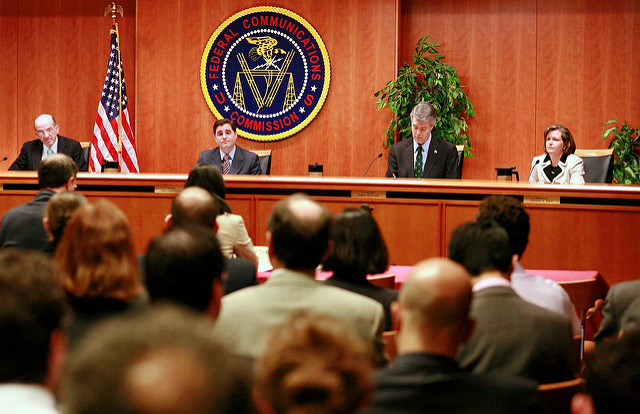Tag Archives: Privacy
AB 2688: Health ‘Privacy’ Bill Would Unleash Information Sharing

6/28 update: AB 2688 was approved in the Senate Judiciary Committee today. Voting in favor of the bill – and against consumers’ interests – were all of the panel’s Democrats: Chair Hannah-Beth Jackson and Senators Robert Hertzberg, Mark Leno, William Monning and Bob Wieckowski. The committee’s two Republicans, Vice … Read More ›
Is Your Set-Top Box Telling Advertisers What You Watch?
by David Lazarus, Los Angeles Times

“They’re hiding the ball,” said Dallas Harris, a policy fellow with the advocacy group Public Knowledge who co-wrote the complaints [to the FCC and FTC]. “They say in their privacy policies that they may collect data on you and they may use it for marketing. They know that’s what they’re doing. So there’s a big disconnect between what they say and what’s actually happening.” Read More ›
Consumer Advocates Back FCC Proposal For Broadband Privacy Rules
by Rick Weber, Inside Cybersecurity

Consumer advocates are backing the general intention of a Federal Communications Commission proposal that would impose privacy requirements on Internet service providers. Read More ›
Virtual Assistants Such As Amazon’s Echo Break US Child Privacy Law, Experts Say
by Mark Harris, The Guardian

An investigation by the Guardian has found that despite Amazon marketing the Echo to families with young children, the device is likely to contravene the US Children’s Online Privacy Protection Act, set up to regulate the collection and use of personal information from anyone younger than 13. Read More ›
Lawmakers Sweat Details Of Consumer Health Privacy
by Cheryl Miller, The Recorder (San Francisco)

“We are in total agreement with the intent of the bill and believe that it’s very, very important that this information be given strong privacy protections,” Richard Holober, executive director of the Consumer Federation of California, told the Assembly Privacy and Consumer Protection Committee. But “we’ve had a lot of experience over the years with various privacy laws and how courts interpret those laws and … we want to be very precise about how a bill is written to make sure that it’s being interpreted by the industry and the courts as it was intended,” Holober said. Read More ›
EFF Sues For Release Of Data On Decryption Requests
by Cheryl Miller, Recorder, San Francisco

Digital liberties group Electronic Frontier Foundation sued the U.S. Department of Justice Tuesday for documents that may shed light on how many times—if ever—the federal government has sought a secret court order forcing companies to decrypt consumers’ information. … The not-for-profit, following up on media reports about the government trying to obtain private source code, [previously] filed a FOIA request with the DOJ’s National Security Division requesting any applications to FISC for court orders seeking “technical assistance” in unlocking data. Read More ›
Wells Fargo To Pay $8.5 Million In Privacy Case, None To Victims
by Kathleen Pender, San Francisco Chronicle

[Penal Code sections 632 and 632.7] make it illegal to record phone conversations without the consent of all parties. Violators can be fined up to $2,500 per call or imprisoned in a county jail. … “This is very different from the kinds of settlements I have seen brought by private attorneys representing consumers” in class-action cases alleging violations of California’s eavesdropping law, said Richard Holober, executive director of the Consumer Federation of California. “In those kinds of lawsuits, individual class members typically can receive hundreds or thousands of dollars if they submit a claim. This involves zero recovery by individual class members.” Read More ›
Broadband Industry: It’s Unfair If Facebook Can Collect Your Data, But AT&T Can’t
by Kate Cox, Consumerist

Later this week, the Federal Communications Commission will be voting on a proposal intended to protect some of your personal data from being shared by your Internet service provider, by requiring that the ISP first get your permission. … ISPs are the conduit for everything you do online, meaning they have access to a lot of potentially sensitive information about you … data about what sites you visit. When. For how long … Read More ›
Employee Surveillance: Business Efficiency Vs. Worker Privacy
by Thomas Claburn, Information Week

“Now, with the advent of almost ubiquitous network records, browser history retention, phone apps, electronic sensors, wearable fitness trackers, thermal sensors, and facial recognition systems, there truly could be limitless worker surveillance,” [a forthcoming California Law Review paper] says. … The authors argue that workplace surveillance has moved beyond a legitimate interest in productivity to shaping individual behavior. As examples of this trend, they cite productivity apps and corporate wellness programs. Read More ›
What’s Our Health Data Worth?
by Jerry Beilinson, Consumer Reports

Medical records shared among doctors and hospitals are covered by HIPAA, the medical privacy law, but data shared among app developers, financial firms, and others is unregulated. … Americans are worried about how health data of all kinds is shared, according to Consumer Reports’ research conducted in 2015. Nearly everyone surveyed – 91 percent – agreed that their consent should be required whenever health information is shared. And 45 percent … found it “creepy” when an ad targeting their medical conditions popped up in a web browser. Read More ›
WhatsApp Encryption Said To Stymie Wiretap Order
by Matt Apuzzo, New York Times

If the Apple dispute is akin to whether the F.B.I. can unlock your front door and search your house, the issue with WhatsApp is whether it can listen to your phone calls. … Those who support digital privacy fear that if the Justice Department succeeds in forcing Apple to help break into the iPhone in the San Bernardino case, the government’s next move will be to force companies like WhatsApp to rewrite their software to remove encryption from the accounts of certain customers. “That would be like going to nuclear war with Silicon Valley,” said Chris Soghoian, a technology analyst with [the ACLU]. Read More ›
Proposed FCC Rules Would Limit How Internet Service Providers Can Use Your Data
by Jim Puzzanghera, Los Angeles Times

“Simply by using the Internet, you have no choice but to share large amounts of personal information with your broadband provider,” FCC Chairman Tom Wheeler said in an article on the Huffington Post. “You have a right to know what information is being collected about you and how that information is being used. … If you have a mobile device, your provider can track your physical location throughout the day in real time. … The bottom line is that it’s your data,” he said. “How it’s used and shared should be your choice.” Read More ›
FCC Cracks Down On Verizon Wireless For Using ‘Supercookies’
by Andrea Peterson, Washington Post

The practice came to the public’s attention in late 2014, when it received criticism from privacy advocates who called the code a “supercookie” because it was almost impossible for users to avoid. … Last January, researcher Jonathan Mayer revealed evidence that others could hijack the supercookie for their own purposes: An online advertising company called Turn was using the codes to help follow people around online, he said. Turn used the supercookie to “respawn” its traditional cookies — even if users took steps to protect their privacy by removing the cookies. Read More ›